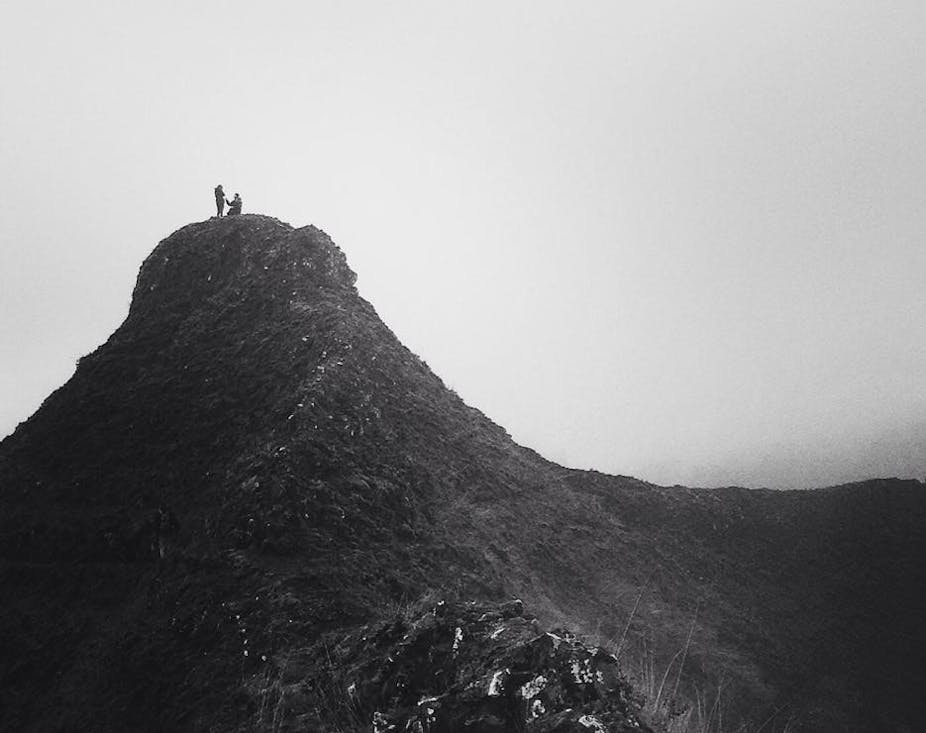Some achieve celebrity, and some have celebrity thrust upon them, to paraphrase Shakespeare’s Twelfth Night. This may be how Alex Geutsitskiy and Katie Verkovod feel, a couple from Oregon who were captured on camera by photographer Paul Wolfe at exactly the moment Geutsitskiy proposed on a peak in the Columbia River Gorge.
Wanting to share the picture with the couple, Wolfe posted it to busy online communities such as Imgur, Reddit, and Facebook, where the groom’s best man found it and contacted Wolfe. While the situation has been very positive for the couple, the case raises questions about what is called “crowdsleuthing” and “sousveillance”, and how they are, and should not be, used.
The term crowdsleuthing, a portmanteau of crowdsourcing and sleuthing, arrived in the fall-out of the Boston Marathon bombing and refers to how huge numbers of people can organise online and help carry out a search or analyse data.
Crowdsleuthing often relates to criminal investigations such as those performed on the Websleuths forum into the “Highway of Tears” unsolved murders and disappearances of young women in British Columbia. Another example is the so-called Reddit Bureau of Investigation where people post to the crowd to help them solve crimes they are involved with from stolen laptops to rape and murder. In criminal crowdsleuthing cases, citizen investigators curate pictures and accounts, post maps, and analyse data from around the web.
Crowdsleuthing is also used in disaster response situations, the most famous being the hunt for Malaysia Airlines flight MH370 which disappeared nine months ago. For these, people share the burden of poring over satellite imagery and other evidence looking for clues that may help official investigators.
But as this case shows, the “wisdom of the crowd” can be used to solve everyday mysteries too. In fact we harness it all the time, for example when we pose questions to our friends or followers on social media asking for suggestions to identify a song stuck in our head, or when families post pictures of ancestors in the hope of identifying them and perhaps finding living relatives.
Opening the Reddit floodgates
Going a step further, though, is to invite people from different cultures around the world to play detective using these “Human Flesh Search Engines” – something that’s as simple as uploading a photograph to an image-sharing site and asking the unseen viewer questions.
While seemingly innocuous, this can lead to people making inferences and exploring hunches in public as they make sense of emerging stories. This can sometimes be constructive – such as when people use social media to help during global disasters.
But it can also be harmful. In more extreme cases this can lead to doxxing, in which people are bullied and shamed by the search for and release of harmful personal details, from real name, address and contact details, to medical or employment details. As the false accusations from the Boston Bombings reminds us, tragedy and witch hunts can ensue.
This is distinctive from, for example, private investigators who used to trawl through local government records to track people down. It’s hard to ensure that people across the world using many social media websites in many jurisdictions answer to any particular standards of ethics or law.

Eyes set always to record
Another concept this case raises is that of sousveillance (literally: “watching from below”) a pun on surveillance (“watching over”). This is the notion that citizens can monitor activities using similar practices to the authorities. Although it seems selfies have most of our attention these days, it’s easy to turn our smartphone cameras around and record what’s going on around us.
There were sousveillance concerns more than a decade ago as camera phones became commonplace, mostly to do with their uses in public toilets and showers, but these seem to have abated even with the rise of reprehensible image-sharing forums for such imagery. There is an ongoing discussion about the ethics of using recording devices in public and private spaces for research purposes, yet there’s not been a similar debate about their propriety in everyday life.
Posting a picture online of strangers involved in an intimate moment without their consent in order to identify them brings together both sousveillance and crowdsleuthing. Using the internet to make this happen inevitably raises concerns about the responsibilities of the hosting websites that make it possible.
Unfortunately, disasters will continue to strike. There will be more floods, earthquakes and missing planes. And partly in response we will continue to see social media and online innovations and improvements to handle these through better media curation techniques and better tools to identify the origins of images and videos. The challenge for society will be to become more savvy with how and what we share about each other, even as it becomes easier to do so. People in public spaces still deserve privacy – and as our lives become more exposed online, consent is of ever increasing importance.
Crowdsleuthing is a powerful force that can satisfy our curiosities about each other. But like the “notorious abuse” of Malvolio in Twelfth Night and his wounded pride, we are reminded that curiosity can be a double-edged sword, and an unwieldy one at that.


